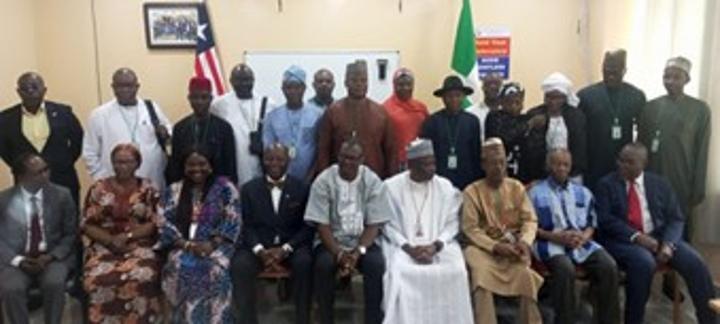Africa-Press – Liberia. The Government of Liberia and its counterpart of Nigeria have shared security concerns and strategies here.
The Director General of the Gabriel L. Dennis Foreign Service Institute (FSI), Reginald B. Goodridge, has applauded a visiting delegation of the National Institute for Security Studies (NISS) of the Federal Republic of Nigeria after holding consultations with Liberian officials.
The NISS delegation that was here for a study tour on the theme: “Non-State Actors in security management issues, challenges and prospects for peace and development in Africa,” engaged with several key Liberian institutions during their stay. These included the head of the Small Arms Commission, the Security Advisor to President Joseph N. Boakai, and the Foreign Service Institute at the Ministry of Foreign Affairs, among others.
Director Goodridge expressed profound welcome on behalf of the FSI, acknowledging the “long-standing friendly and historical relationship that exists between Liberia and Nigeria.” He likened the bond between the two nations to that of a family, referring to them as “cousins.”
Goodridge highlighted the FSI’s enthusiasm to be involved in the planning and implementation of the study tour, noting that the theme perfectly aligns with the institute’s curriculum as they prepare diplomats and Foreign Service personnel for an “ever-changing, often benevolent and uncertain” global environment.
“We imbue our students in academic disciplines such as environmental security in diplomacy, cyber security, conflict resolution and negotiation, and security awareness in the face of the threats of terrorism, sabotage, and cross-border incursions”, he said.
The former Information Minister added that his team has identified various categories of non-state actors for the purpose of this study tour, with the aim of deepening contemplation on how to mitigate potential threats to peace and development in Africa.
He listed a wide array of such actors, including middlemen, arms dealers, drug dealers, the media (both liberal and conservative), civil society groups, NGOs, multinational corporations, rebel groups/armed insurgents, academia, the wealthy class (technology tycoons, millionaires, and billionaires), sports personalities, entertainment personalities, the pharmaceutical industry, and underprivileged youths, among others.
He then posed a crucial question: “The issues that we have to reckon with is, what motivates these non-state actors so that their actions may have a negative impact on peace and development in our part of the world?”
While acknowledging that not all non-state actors are inherently negative and many ostensibly act for the good of society, he urged a critical examination of their altruistic motivations.
He suggested a need to “examine the connections between legitimate state actors and non-state actors,” presuming that many may have indirect or “back-channel connections with state actors to advance whatever designs they may be pursuing for the benefit or deficit of our respective publics, and thereby our continent.”
Madam Vivian Ifeoma Okpe, head of the NISS delegation, reciprocated sentiments, noting that their visit to Liberia was intended to foster shared understanding of the challenges confronting various security actors across Africa.
For More News And Analysis About Liberia Follow Africa-Press






